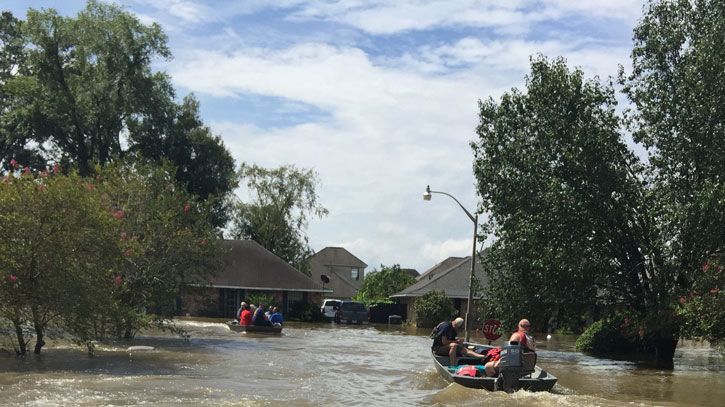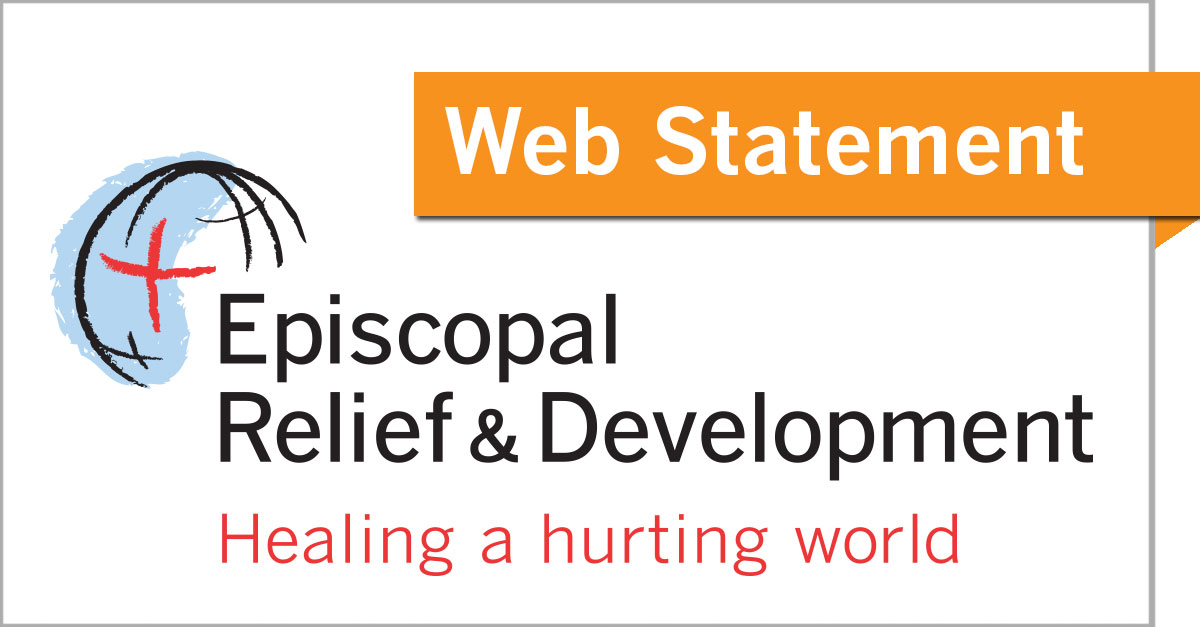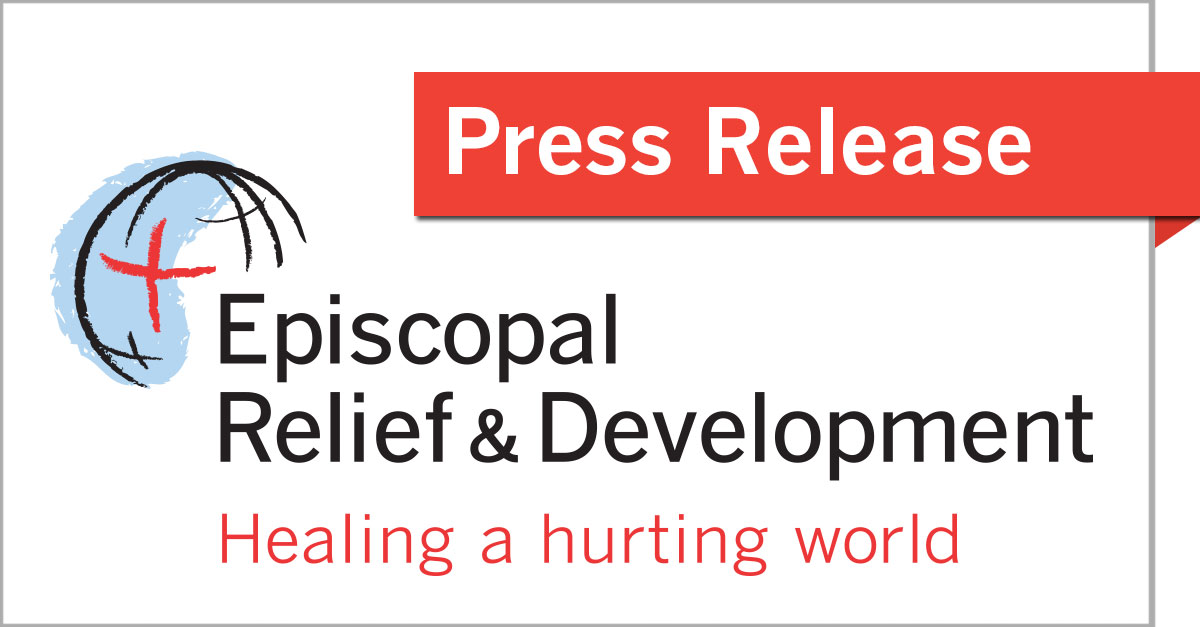Gulf Coast Episcopal Dioceses Respond to Severe Flooding

Episcopal Relief & Development is supporting diocesan leaders along the Gulf Coast who are coordinating flood response efforts after several days of heavy rainfall across the region.
- 8/22: Episcopal Relief & Development Supports Western Louisiana Diocese Flood Response
- 8/17: Episcopal Relief & Development Supports Louisiana Dioceses in Flood Response
- 8/16: Pastoral Letter from Bishop of Louisiana; Update from Western Louisiana
Download Bulletin Insert
English: PDF | JPG
Spanish: PDF | JPG
Episcopal Relief & Development is supporting the flood response activities of the Episcopal Diocese of Western Louisiana following widespread flooding over the southern part of the state. The diocese is equipping local shelters with necessary supplies and providing individual assistance for minor repairs and replacement of lost items, as well as temporary housing and temporary storage.
Five of the 20 parishes (counties) included in the August 17 federal disaster declaration are in the Diocese of Western Louisiana, and local churches are assessing and responding to immediate needs in their areas. Although many have been able to return to their homes or secure temporary housing, approximately 2,800 people are still in shelters, down from 10,000 immediately after the storms.
“All clergy have been contacted and encouraged to reach out to established Red Cross shelters,” wrote Western Louisiana Diocesan Disaster Coordinator Deacon Lois Maberry. “Several of the churches have relationships with homeless shelters [and other community ministries] and clergy have been encouraged to evaluate needs there also.”
The Diocese of Western Louisiana has urged churches to reach out and accompany impacted households in applying for FEMA assistance. Louisiana state officials say an estimated 60,000 homes were damaged by flooding across the southern part of the state, and more than 106,000 people have registered for federal disaster assistance.
In the Episcopal Diocese of Louisiana, The Rt. Rev. Morris K. Thompson, Jr., posted an update on parish and diocesan recovery efforts. Bishop Thompson visited Episcopal School of Baton Rouge, which reopened on August 22, and St. Francis Episcopal Church in Denham Springs, which was able to hold Sunday worship on church grounds thanks to a delivery of supplies from the Episcopal Diocese of Texas. Worship was celebrated by The Rev. Mark Holland, Diocesan Flood Response Coordinator, who is compiling lists of resources and needs in the diocese in order to organize response efforts.
Please continue to pray for all those impacted by the flooding and for church communities who are reaching out to care for their most vulnerable members and neighbors.
To enable Episcopal Relief & Development to respond to the flooding in Louisiana, please donate to the US Disaster Response Fund.
A bulletin insert is available in English and Spanish for congregations wishing to engage members in prayer and action in support of the flood response.
Download Bulletin Insert
Helpful Links
- Episcopal Diocese of Louisiana Website and Facebook Page
- Episcopal Diocese of Western Louisiana Website and Facebook Page
Download Bulletin Insert
English: PDF | JPG
Spanish: PDF | JPG
Episcopal Relief & Development is supporting the Episcopal Diocese of Louisiana’s emergency response efforts in the wake of widespread flooding that has affected more than 40,000 homes across the state. Some areas received more than 24 inches of rain, with record precipitation of up to 30 inches around Baton Rouge. As of August 17, 20 Louisiana parishes (counties) had been included in the federal disaster declaration due to flooding, notably Ascension and Livingston along the Amite River. One third of the 45,000 homes in Ascension were flooded when the river overtopped the levee nearby, and more than 90% of homes in the town of Denham Springs have been affected. The rural parish of Tangipahoa is also severely impacted, and assessments are ongoing.
With support from Episcopal Relief & Development, the Episcopal Diocese of Louisiana is responding to immediate needs such as food, emergency housing and storage, gasoline and replacement of lost items by distributing gift cards at churches and shelters. Over the long-term, the economic impact of the flood will fall most heavily on those least able to recover quickly, with road and business closures resulting in lost income on top of repair costs.
“The Episcopal Diocese of Louisiana has many strong lay and clergy leaders at both the congregational and diocesan level with extensive disaster response experience and connections,” said Katie Mears, Director of Episcopal Relief & Development’s US Disaster Program. “This experience allows for streamlined processes and wisdom about how to best serve the needs of their neighbors, both in the short-term, but especially in the weeks, months and years to come.”
The Episcopal Diocese of Louisiana stated that St. Francis Episcopal Church in Denham Springs reported damage to its building, and that many clergy, parishioners, staff and friends across the diocese have home damage and are staying in shelters or with family. Episcopal School of Baton Rouge was also affected but reports that 80% of its classrooms are undamaged and it will reopen on August 22.
In the Episcopal Diocese of Western Louisiana, a large portion of the diocese is included in the federal disaster declaration.Diocesan leaders are working with local churches to assess needs as they respond in their communities. The response may include gift cards and other support for immediate emergency needs. Episcopal Relief & Development is in close contact with the Diocesan Disaster Coordinator and expects the partnership to develop over the coming weeks.
FEMA warns of heavy rain through August 20 from Texas to Alabama and likely flooding in Louisiana and further north along the Mississippi River. Emergency preparedness activities such as creating a disaster kit and ensuring adequate supplies of food and water at home are outlined in Episcopal Relief & Development’s web resources.
Please continue to pray for all those impacted by storms and flooding, for first responders who are conducting rescue operations and for church communities who are reaching out to care for their most vulnerable members and neighbors.
To enable Episcopal Relief & Development to respond to the current Gulf Coast flooding and support emergency preparedness and long-term recovery efforts in the United States, please donate to the US Disaster Response Fund.
A bulletin insert is available in English and Spanish for congregations wishing to engage members in prayer and action in support of the flood response.
Download Bulletin Insert
Helpful Links
- Episcopal Diocese of Louisiana Website and Facebook Page
- Episcopal Diocese of Western Louisiana Website and Facebook Page
For over 75 years, Episcopal Relief & Development has served as a compassionate response to human suffering in the world. The agency works with more than 3 million people in nearly 40 countries worldwide to overcome poverty, hunger and disease through multi-sector programs, using the Sustainable Development Goals (SDGs) as a framework. An independent 501(c)(3) organization, it works closely with Anglican Communion and ecumenical partners to help communities create long-term development strategies and rebuild after disasters.
Download Bulletin Insert
English: PDF | JPG
Spanish: PDF | JPG
Episcopal Relief & Development is supporting diocesan leaders along the Gulf Coast who are coordinating flood response efforts after several days of heavy rainfall across the region. According to FEMA, the slow-moving storm brought 10-20 inches of rain to Louisiana and the surrounding states beginning August 11, and flooding continues although the heaviest rain has moved on. Louisiana and Mississippi are both under a state of emergency, and the federal government issued a major disaster declaration for Louisiana. At least ten people have died.
The Rt. Rev. Morris K. Thompson, Jr., Bishop of the Episcopal Diocese of Louisiana, issued a pastoral letter on August 15 stating the known damage to church properties and highlighting the effectiveness of the “Alert Media” system being piloted in partnership with Episcopal Relief & Development.
“[W]e were able to quickly ascertain if anyone was in immediate flooding danger. We also used it as an opportunity to gather all of the clergy in a conference call that was conducted this morning,” he wrote. Bishop Thompson remarked that there was nearly 100% participation in the conference call among clergy and parishes across the diocese.
Deacon Elaine Clements, Disaster Coordinator for the Episcopal Diocese of Louisiana, is working with The Rev. Canon Shannon Manning, Canon to the Ordinary, to coordinate relief efforts with Episcopal Relief & Development and communicate with congregations to meet local needs. In addition, Bishop Thompson has appointed The Rev. Mark Holland to coordinate relief efforts in the Baton Rouge area as the diocese moves “from emergency relief to long-term disaster recovery and assistance.”
Bishop Thompson’s letter includes information for donating to Episcopal Relief & Development’s US Disaster Response Fund, and the diocesan website includes links to a number of the agency’s disaster preparedness and response resources.
In the Diocese of Western Louisiana, Disaster Coordinator Deacon Lois Maberry writes that assessment efforts are currently underway to ensure that people in flooded areas are accounted for and safely sheltered, and that damage assessment will begin when the water recedes. Her message encourages donations to Episcopal Relief & Development and states: ”As conditions improve and there are needs for volunteers I will send out other communications. In the meantime, if churches would like to donate something tangible, please consider gift cards. These are easily mailed to the churches in the area and can be given out as needed for various supplies.”
FEMA warns of heavy rain through August 20 from Texas to Alabama and likely flooding in Louisiana and further north along the Mississippi River. Emergency preparedness activities such as creating a disaster kit and ensuring adequate supplies of food and water at home are outlined in Episcopal Relief & Development’s web resources.
Please continue to pray for all those impacted by storms and flooding, for first responders who are conducting rescue operations and for church communities who are reaching out to care for their most vulnerable members and neighbors.
To enable Episcopal Relief & Development to respond to the current Gulf Coast flooding and support emergency preparedness and long-term recovery efforts in the United States, please donate to the US Disaster Response Fund.
|
A Prayer for First Responders Blessed are you, Lord, God of mercy, who through your Son gave us a marvelous example of charity and the great commandment of love for one another. Send down your blessings on these your servants, who so generously devote themselves to helping others. Grant them courage when they are afraid, wisdom when they must make quick decisions, strength when they are weary, and compassion in all their work. When the alarm sounds and they are called to aid both friend and stranger, let them faithfully serve you in their neighbor. We ask this through Christ our Lord. Amen. — Adapted from the Book of Blessings, #587, by Diana Macalintal |
Header image: courtesy of Tanya Dillon




